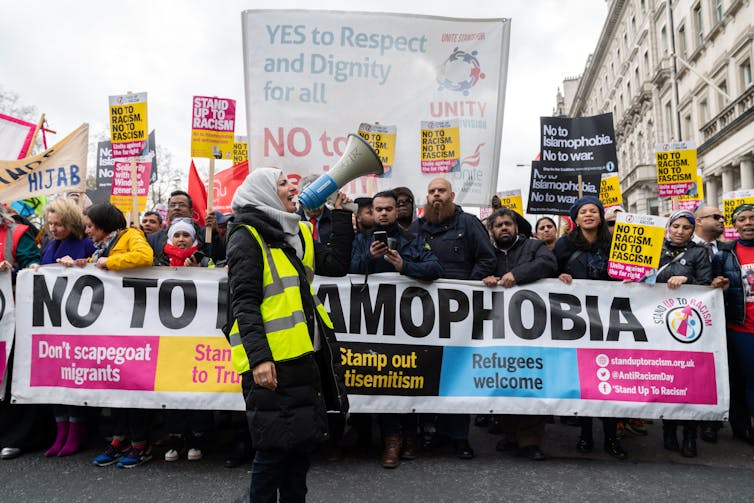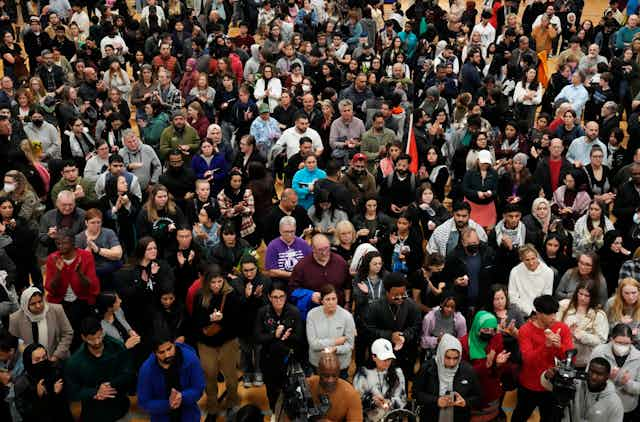In political communication, a big lie — what is known as the “illusory truth effect” — is when the constant repetition of misinformation makes people more likely to accept it as truth.
Repetition is how lies gain traction. The more exposure to specific ideas and tropes that may be false claims, the more likely it is that this misinformation becomes understood as real.
A plethora of fake news circulates on the internet and social media. Unlike misinformation, which refers to false or inaccurate information, disinformation campaigns deliberately spread propaganda to create fear and suspicion.
Read more: Israel-Gaza conflict: when social media fakes are rampant, news verification is vital
Disinformation industries, and the brokers who exchange in this false currency, have an immense capability to circulate propaganda and conspiracy theories to a greater public, outside of their own echo chambers.
Producing social fictions
Through media outlets and co-ordinated networks, Islamophobic and anti-Palestinian tropes and conspiracies are circulated. Eventually, they become regarded as social facts, especially in times of war, conflict and heightened political tensions.
During these fraught times, the ability to authorize wholesale violence relies on circulating dehumanizing tropes and “scare stories.” This targeted propaganda frames entire populations as deviant “folk devils,” responsible for crimes and social problems. This then creates moral panics, used to justify acts of oppression.
A violent threat
In my book, Under Siege: Islamophobia and the 9/11 Generation, I document how since 9/11, two billion Muslims globally have faced collective punishment. Constructed as folk devils who imperil western societies, Muslims have been framed as inextricably linked with the support and promotion of violence.
More recently, this trope was evident in public statements made by Canadian politicians, including Prime Minister Justin Trudeau. Toronto Mayor Olivia Chow described recent Palestinian solidarity rallies and movements as “glorifying” violence and characterized anyone attending these events as “Hamas supporters.”
The ubiquity of Islamophobia has led to generalized stereotypes of Muslims and Palestinians (including those who are not Muslim) as being prone to violence and terrorism. When these racist narratives are espoused by politicians, they falsely equate the support of Palestinian people with support for terrorism and instil fear and moral panic about the Muslim presence in this country and elsewhere.

Anti-Muslim policies
Public belief in the vilifying narratives of violent Muslims can become second nature to people who watch biased news reports on mainstream media and a variety of social media platforms that circulate anti-Muslim narratives.
For instance, negative Canadian attitudes about Muslims were evident in a 2017 Radio Canada poll. Fifty-one per cent of respondents in Canada — and 57 per cent in Québec — felt the presence of Muslims in this country made them “somewhat” or “very worried” about security. Nearly one out of four Canadians — 23 per cent — would favour a ban on Muslim immigration to this country, a level of support that rose to 32 per cent in Québec.
Widespread Islamophobic sentiments translate into anti-Muslim policies and practices. Recently, Markham Public Library in Ontario temporarily removed Islamic Heritage Month displays from its branches after an email was sent to staff saying that, “given the current situation in the Middle East, it is best for us not to be actively promoting the Islamic Heritage Month … .”
Islamophobia also has more deadly consequences. In 2021, four members of a Canadian-Pakistani Muslim family were mowed down and killed by a truck in the Ontario city of London. Evidence introduced at the trial of the man accused of the murders has shown that after his arrest, he repeatedly referred to fabricated scare stories about Muslim “grooming gangs” when being interrogated by police.
Online rumours and disinformation
The unsubstantiated claims of Hamas decapitating and burning 40 Israeli babies were repeated by international heads of state, celebrities and media outlets, despite the fact that there was no official confirmation by Israeli authorities of this alleged horrific act.
Nonetheless, the repetition of this false story led to the dehumanizing characterization of Palestinians as “bloodthirsty monsters” and “human animals,” fomenting widespread anti-Palestinian racism.
These campaigns of disinformation and demonization also tragically resulted in the murder of Wadea Al-Fayoume, a six-year-old Palestinian-American Muslim boy, in Plainfield, Ill. He was stabbed 26 times, allegedly by his family’s white landlord, who is also accused of repeatedly stabbing Al-Fayoume’s mother, proclaiming, “You Muslims must die!”
Casualties of war
These violent trajectories bring to mind the military maxim attributed to the Ancient Greek playwright Aeschylus, which warns that “In war, truth is the first casualty.” In times of war and conflict, disinformation is the first weapon to be deployed.
Uncritically consuming political or media narratives is no longer an option. In these dystopian times, the public needs to be able to separate fact from fiction as fabrications masquerade as truth. The consequences are dire.
This article has been updated to include a reference to the ongoing trial in the London, Ont. case.


